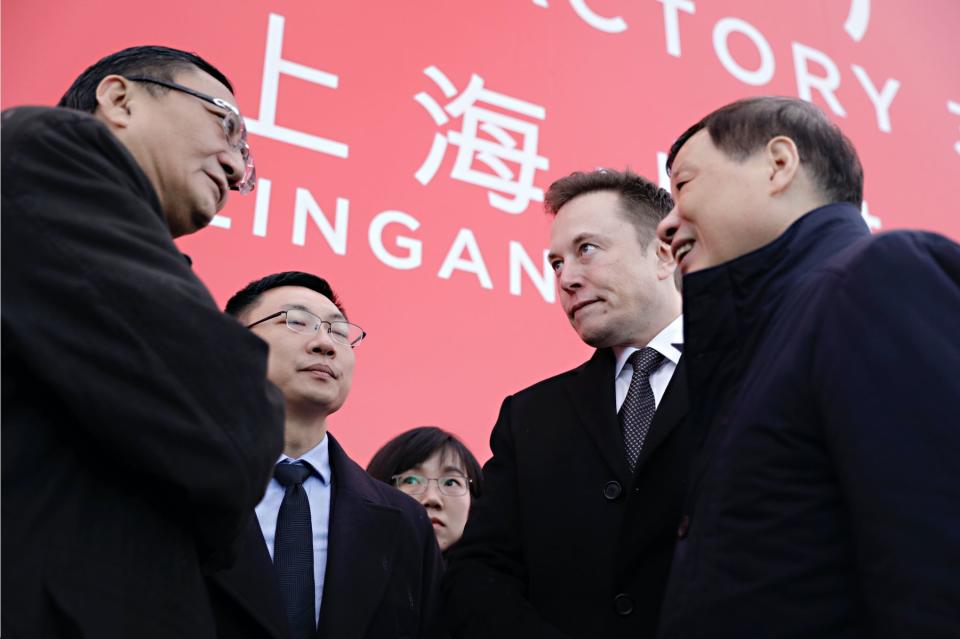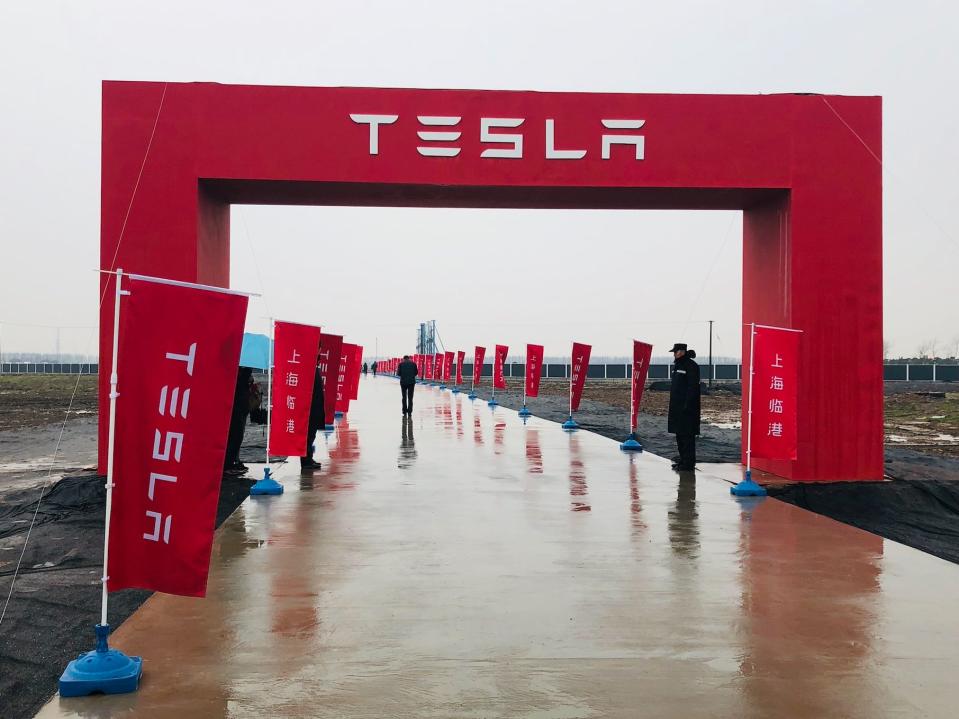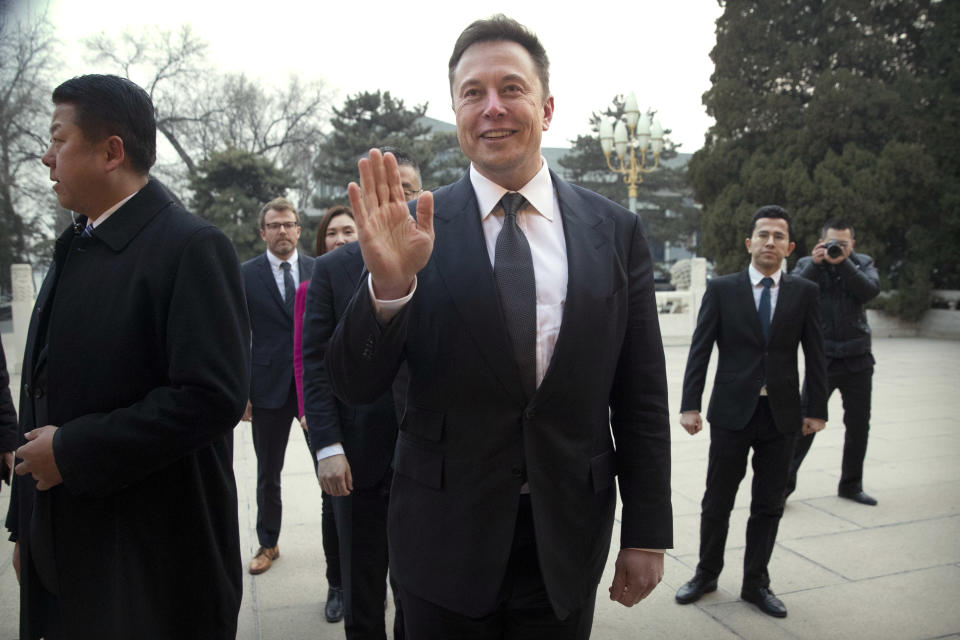Analyst: 'Trump is going to come down on' Tesla
This post has been updated with comments from Tesla.
One of the solutions Tesla (TSLA) came up with to tackle delivery and production issues may have left it vulnerable to President Donald Trump’s ire, according to Vertical Research Group Analyst Gordon Johnson.
“I think once the Trump administration understands what they’re doing, I think Trump is going to come down hard on them,” Johnson, a longtime Tesla bear who noted that he does not hold a personal position in Tesla, said on Yahoo Finance’s The Final Round. “And I think that’s the big risk that people aren’t talking about.”
Tesla in early January broke ground at its new manufacturing plant in Shanghai, marking the first wholly foreign-owned car plant in China. The plan is for the company to produce its least expensive vehicle, the Model 3, by the end of the year and reach high volume production next year. Shanghai production of the base Model 3, as well as the Model Y, will serve the Greater China region, Tesla CEO Elon Musk said in a series of Tweets. A source familiar told Bloomberg last August that the company was investing $5 billion in the Chinese factory.
The company said in an update letter earlier this week that it expects 2019 capital expenditure to total about $2.5 billion. “We believe this amount should be sufficient to continue to develop our main projects, such as Gigafactory Shanghai, Model Y and Tesla Semi, as well as for the further expansion of our Supercharger, service and retail networks. We expect to arrange financing through local banks in China to fund most of the capex for Gigafactory Shanghai,” the statement read.

Breaking ground at the Shanghai Gigafactory – the result of years of negotiations with local officials – came as a major win for Tesla as it grapples with potentially weaker demand in the U.S. after reductions in federal tax credits for electric vehicles. Tesla cut prices of all its vehicles in the U.S. by $2,000 earlier this year after the electric vehicle subsidy was halved to $3,750 from $7,500. The China-based Gigafactory will also help insulate Tesla from import duties as the U.S. and China continue to work toward a new trade agreement.
Johnson explained why he believes it’s just a matter of time before the Trump administration cracks down on Tesla’s overseas operations.
“They just cut 7% of their workforce, and six months ago they cut 9% of their workforce,” Johnson said. “That's a 16% cut to people in the United States, and now they're building a Gigafactory in China where they say they're going to produce a $35,000 car and then ship it to the United States to sell it.”
A Tesla spokesperson denied that any vehicles produced in China would be sent to the U.S., citing the company’s third-quarter 2018 update letter, which states that “production in China will be designated only for local customers.”
The spokesperson also pointed to the company’ Q2 letter, which states: “Vehicles produced at Gigafactory 3 will augment our existing capacity in order to meet growing local needs, which means our U.S. manufacturing operations will not be affected.”
‘We need to bring the Shanghai factory online’
It wouldn’t be the first time Trump cracked down on an American company for moving operations abroad. Trump last year criticized Harley-Davidson (HOG) for moving some of its motorcycle production overseas to avoid added tariffs on motorcycles sold in the European Union. In a tweet in August, Trump encouraged consumers to “boycott the company.”
Prior to that, Trump in 2017 assailed Toyota (TM) after the car-maker announced plans to open a factory in Guanajuato, Mexico and said it would face a “big border tax” if it built its Corolla plant outside the United States. Toyota eventually decided to build the Corolla at a new U.S. manufacturing plant, while moving Tacoma pickup trucks at the Mexico plant – earning praise from Trump.
That said, it’s less likely that Musk – who has historically had an antagonistic relationship with federal regulators – would be willing to bend to any potential pressures from the U.S. government, especially given the investment Tesla has poured in so far to the Shanghai Gigafactory and the outsized role it will play in bringing Tesla’s vehicle production up-to-speed.
“We need to bring the Shanghai factory online,” Musk said during a call with investors earlier this week. “I think that’s the biggest variable for getting to 500,000-plus a year.”

‘Demand problem’
The Shanghai Gigafactory will help Musk deliver Tesla vehicles into one of the biggest demand centers for electric cars. Multiple reports have situated China as a leader in electric vehicle demand, adding to the country’s title as the world’s largest car market.
China’s new, more stringent rules promoting new-energy vehicles helped sales of electric cars top one million in 2018 for the first time ever.
Embedding itself into this mega-market for electric vehicles will help Tesla offset some of the demand softness it’s seen in other markets.
“I think that sales in the United States and North America have collapsed,” Johnson said. The reduction in the U.S. electric vehicle tax credit – which will halve again to just $1,875 this summer – has played a major role in the softer domestic demand, Johnson said. He noted that when the state of Georgia slashed its own tax credit on electric vehicles several years back, electric vehicle sales swan dived.

Johnson’s concerns have also been echoed by other analysts, who also cited domestic EV subsidy reductions as risks for the company.
“The pace of adoption for connected vehicle, autonomous systems, vehicle electrification and safety may be strongly influenced by government regulations, subsidies and mandates,” analysts from Cowen wrote in a note about Tesla earlier this week. “Share prices and financial results maybe be sensitive to policy changes and outcomes may be difficult to predict, due to the political nature of the process.”
Musk, for his part, does not see demand as a major inhibiting factor for Tesla, and said during a call with investors that he sees “pretty nutty” growth in demand this year the Tesla vehicles, and that demand for the Model 3 specifically is “insanely high.”
But Tesla management on the call also indicated that Tesla is essentially currently only making cars for Chinese and European markets right now, and expects a gap of about 10,000 vehicles between production and deliveries due to vehicles still in transit at the end of the first quarter.
“We believe this is a strong indication that demand in the U.S. for both the mid-range and long-range/performance Model 3 versions has largely been exhausted,” Cowen analysts wrote in a note.
“I think they have a demand problem,” Johnson said.
Clarification: A previous version of this post stated that Tesla claimed to be investing $5 billion in the Chinese factory. In fact, a source close to Tesla told Bloomberg that that was the plan.
—
Emily McCormick is a reporter for Yahoo Finance. Follow her on Twitter: @emily_mcck
More from Emily:
What Wall Street strategists forecast for the S&P 500 in 2019
Beer sales are lukewarm and pot could be part of the problem
Consumer sentiment plunges to its lowest level since Trump’s election
What corporate America is saying about the government shutdown
Follow Yahoo Finance on Twitter, Facebook, Instagram, Flipboard, LinkedIn, YouTube, and reddit.
